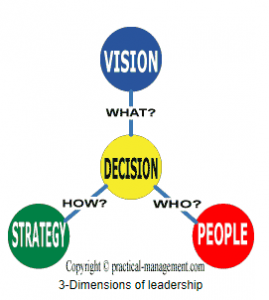It’s become a buzz word in the business world, but what exactly is organizational leadership? Let’s start with the meaning the word “organization.” Type the word into google, and you’ll find the definition: [noun] an organized body of people with a particular purpose, especially a business, society, association, etc. This five-syllable word is used to describe the process of when people gather together and form something based on common beliefs or goals. So, an “organization” actually activates two subjects: the individual, and the group.
Now, let’s think about “leadership.” The leader of an organization is in charge of decision-making. This means that they must balance all of the organization’s needs in making those decisions. They analyze what is best for the goals of the full team, consisting of all of its members, and what is best for each member individually. Organizational leaders manage a full slew of group and individual variables, both from the perspective of the group’s goals, and as an advocate for the individual.
So, how does one leader harness their team? How do they carefully consider personalities, individual skill sets and experience levels, all while striving for a common goal? First, the group’s goal must be specifically and clearly defined. The goal should be in writing, and it must be common knowledge among employees of the organization. Next, plans to meet those goals must be formulated, and then individuals should be organized to achieve those goals.
A simple diagram helps describe the dimensions of leadership:

In the center, there is a leadership decision. Branching out from the center are three elements: vision, strategy, and people. These three elements must be coordinated by a manager who decides on the how, the what, and the who, in order to reach the decision. Effective decision making is an essential skill for any organizational leader, therefore Master’s level courses in Organizational Leadership, such as Goodwin University’s MSOL program, offer specific training in the metrics and techniques of decision making.
Leaders harness people, they define strategy, and they reach goals with a vision in mind. Leadership, however, doesn’t have to be limited to a select few. Though dynamic personality traits can be helpful, any employee who has the passion to learn the techniques of managing in the workplace can be a successful leader. With an MSOL degree, employees can move into supervisory roles in any sector, from government to non-profit, finance to education, and onward.
Speaking of employee development, leaders’ traits also have a profound impact on their peers and employees. According to an article in the Huffington Post, good leaders help employees develop their own leadership skills. They motivate others and hold them to high expectations. They organically make employees want to be better. Human nature suggests that people will work better for leaders that they trust. So, what else is organizational leadership besides harnessing people, defining strategy, and clearing the path in order to make decisions? It’s being an ethical manager with superb listening skills, and building others up.
Organizational leadership concerns the motivation of others. Perhaps you’re a strong employee. You’re a positive thinker. You build up your teammates, and problem-solve outside of the box. With curriculum like Foundations in Leadership, Talent and Performance Management, Sustainability of Innovation and Strategic Advantage, and Leading Organizational Change, today’s excellent employees can learn the skills to become tomorrow’s organizational leaders. If you’re looking for advancement in your career and your life, consider organizational leadership as your calling. Contact Goodwin University’s team today to find out more about our part-time, online, flexible MSOL program!
Goodwin University is a nonprofit institution of higher education and is accredited by the New England Commission of Higher Education (NECHE), formerly known as the New England Association of Schools and Colleges (NEASC). Goodwin University was founded in 1999, with the goal of serving a diverse student population with career-focused degree programs that lead to strong employment outcomes.

